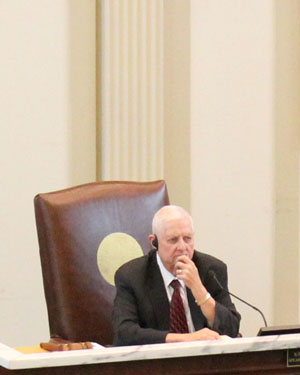
State Rep. David Dank (R-Oklahoma City) presides over a meeting of the Task Force for the Study of State Tax Credits and Economic Incentives.
Joe Wertz / NPR/StateImpact


State Rep. David Dank (R-Oklahoma City) presides over a meeting of the Task Force for the Study of State Tax Credits and Economic Incentives.
Joe Wertz / NPR/StateImpact

Joe Wertz / NPR StateImpact
Task force co-chair David Dank presiding over a meeting of the Task Force for the Study of State Tax Credits and Economic Incentives.
A legislative task force’s final report could make it harder for some Oklahoma companies to avoid paying their full tax bill, a legal dodge that has cost the state millions in tax revenue.
State Rep. David Dank, R-Oklahoma City, has been trying to shed light on transferable tax credits for months.
His beef is that these taxpayer dollars, intended for things like the purchase of locally produced coal and the construction of energy-efficient homes, often end up with third parties who have nothing to do with the industries the credits are meant to support. Banks and insurance companies buy them to decrease their tax liability.
“Taxpayer dollars should never be traded around to the highest bidder in a shell game like some we have seen,” Dank said. “Any tax credit should at minimum benefit only the recipient.”
[module align=”right” width=”half” type=”pull-quote”]
“I don’t think that we yet have enough facts. I do think we have rhetoric.”
[/module]
Vernon McKown is co-owner of Ideal Homes and benefits from the energy efficiency credit. But the amount he owes in taxes is far less than the number of credits he qualifies for. So, he makes money off the leftovers.
“A tax credit sells for about 80 to 85 cents on the dollar,” he said. “So, in Oklahoma, you could buy $10,000 worth of tax credits for $8,000 or $8,500, and you would save $1,500.”
It’s not just big businesses and insurance companies buying transferable credits. Practically any individual can buy them.
I actually drove to Phoenix Coal Sales in Vinita to buy one for myself. It started off promising when I called and talked to one of the company’s secretaries, but when I arrived, the deal fell through. Vice President Clay Hartley emerged from his office and shot me down.

Logan Layden / NPR StateImpact
Clay Hartley, Vice President of Phoenix Coal Sales, discusses transferable tax credits in his Vinita, Okla. office.
“What’s the difference to you whether you have a tax credit or not? Why are you pushing so hard for the tax credit?” Hartley said. “We’re not trying to hide anything, and if you start insinuating we’re trying to hide something … I’ve had enough disparaging remarks from some members on the committee that, quite frankly, we’re just backing away from it … You know, turn that [recorder] off.”
Transferable credits are a touchy subject right now.
Before the current two-year moratorium, eight transferable credits cost the state more than $74 million from 2007-2009. But just how much of that amount was actually transferred is obscured from the public — and the State Tax Commission. Rep. Dank says it could be as high as 90 percent.
Business owners turn their accounting firms or brokers to deal in what’s become a transferable credit market.
One such broker is Josh Lederer, Vice President of Fallbrook Capital, based in Los Angeles. He says about 20 states have transferability programs and ending them would cause the credits to lose their incentive power.
“Then you basically have something you can’t use,” Lederer said. “If the credits are not transferable and I generate a credit, but I’m not paying taxes in the state, then I really have no need for it. There’s no benefit from it.”
Recipients say the market in tax credits is good for business and the money they get from selling credits stays in Oklahoma. State Treasurer Ken Miller says just because a credit is transferable doesn’t make it bad.
“I don’t think that we yet have enough facts. I do think we have rhetoric,” he said.
Now, the future of Oklahoma’s transferable tax credits will be in the hands of the same body that created them in the first place, the state legislature.